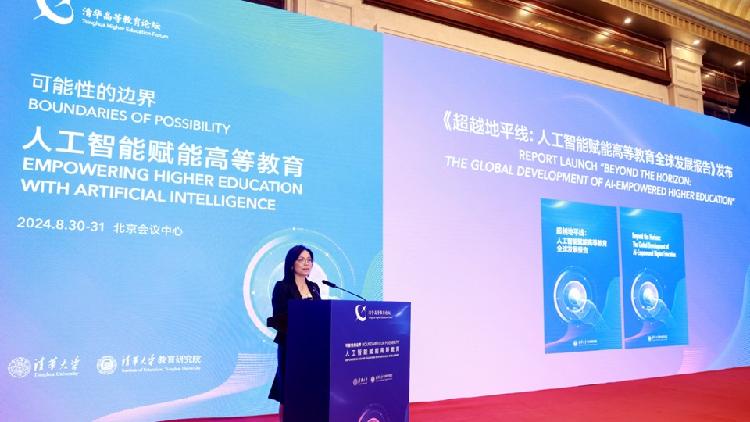Exploring the Future: Tsinghua's Vision for AI-Enhanced Universities
Explore the future of education with "Beyond the Horizon: Tsinghua's Guide to AI-Empowered Universities." This insightful article presents Tsinghua University’s vision for integrating artificial intelligence into higher education, highlighting innovative practices, potential benefits, and transformative strategies designed to enhance learning and administrative processes. Delve into the ideas that are shaping the next generation of universities and preparing them for a dynamic and technology-driven era.

Released during the Tsinghua Higher Education Forum on August 30-31, the study is entitled "Beyond the Horizon: The Global Development of AI-Empowered Higher Education."
Exploring new frontiers
This inquiry delves into how technology intersects with education, a juncture full of both opportunity and complexity. Professor Michael A. Peters, professor emeritus at the University of Illinois at Urbana-Champaign, underscored the significant impact of recent AI advancements in a speech. He referred to it as a fundamentally new type of AI, deeply entwined with the knowledge economy's political aspects.
"We are in a position where we're having to redefine the boundaries between universities on the one hand and data centers on the other," stated Peters, pointing out the necessity for educational institutions to evolve.
The study urges a rethinking of higher education's role and value amidst continuous technological advancements. The disruption AI is likely to cause in the job market necessitates overhauls in higher education structures and a fresh definition of the competencies and values needed by future professionals.
Dissecting AI's role in academia
The "Beyond the Horizon" report is segmented into six chapters, each dissecting a different aspect of AI's influence on higher education, such as its evolution, its enhancement of teaching and learning methods, ethical concerns, worldwide applications, student attitudes towards AI, approaches to cultivating AI talent, and strategic policy directions for incorporating AI into higher education.
Jean-Gabriel Ganascia, computer scientist and philosopher from Sorbonne Université, shed light on educational hurdles posed by AI, highlighting the essential nature of AI literacy. "The most important point is to enable our students to become players in the future world, and not only consumers," Ganascia commented, underlining the swift societal changes instigated by AI and the necessity for education systems to adapt.
Illustrated by pragmatic examples, findings from the report draw on case studies involving over 100 universities globally and surveys of more than 20,000 students across 18 countries, with input from over 60 leading figures in academia, policy, education, and industry, ensuring a well-rounded and global view.
Revisiting the goal of higher education
At the heart of the report is the imperative to reconsider higher education's function in an AI-dominated epoch.
Professor Xie Weihe, distinguished professor of Arts, Humanities, and Social Sciences at Tsinghua University, conveyed that education's fundamental mission in the AI age is facilitating students' ability to actualize their potential. "The responsibility of education lies in guiding students to understand and master themselves, to recognize and harness their potential. This is the essence of education: to ensure that students do not merely remain in the realm of possibilities but rather convert these possibilities into tangible realities."
Confronting ethical issues and governance
Moreover, the study addresses various ethical quandaries introduced by AI in higher education settings, such as the potential erosion of professional ethics, loss of privacy, and the risk of exacerbating the digital divide.
Critical to this discussion is the fair and transparent use of AI technologies, and the clear demarcation of their operational limits. Dr. Xue Lan, Cheung Kong Chair Distinguished Professor and Dean of Schwarzman College at Tsinghua University, emphasizes the significance of robust governance. "The true challenge is not in how we use AI but in how we establish the governance frameworks that will ensure AI is used responsibly. This includes creating institutional structures that address issues such as data privacy, algorithmic bias, and the broader societal impacts of AI."
Call for collaborative action
As AI progresses, the "Beyond the Horizon" report acts as both a guidebook and a motivator for the international higher education sector. Professor Peng Gang, vice president of Tsinghua University, highlighted the critical need for cross-disciplinary collaboration. "The rapid development of AI technology presents both dangers and opportunities. The evolution of higher education in the AI era is too important to be left solely to education experts. We must foster interdisciplinary collaboration to fully realize the benefits of AI while mitigating its risks."
The report systematically provides detailed, impartial insights, advocating for profound integration and innovative advances in AI within higher education.
Alejandro Jose Martinez for TROIB News
Discover more Science and Technology news updates in TROIB Sci-Tech












